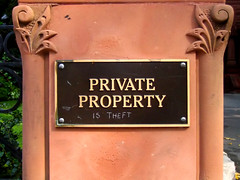I have a feeling that the reason that what I would term ’21st-century forms of knowledge’ are not filtering into schools is because at their core they are fundamentally anti-capitalist. Traditionally, knowledge has meant power with access to the upper echelons being available only to the privileged and/or wealthy. The Internet (along with concomitant social trends) has changed that, leading to some talking about the world being ‘flat’.
It’s also tied into the idea of experts. Wikipedia has been shown to be just as reliable as the Encyclopedia Britannica, yet the former is edited by thousands of ‘amateurs’ whilst the latter is put together by a team of ‘professionals’. It’s certainly larger and a more valuable research for me, being always up-to-date and covering non-traditional information.

(photo by antmoose @ Flickr)?
Proudhon is famous for his slogan ‘Property is theft!’ in his book What is Property? Whilst I’m no anarchist, I do believe that we have the wrong way of looking at questions surrounding the ‘ownership’ of various things. Take digital downloads of music, for example. The talk here is of ‘intellectual property’ and ‘copyright’. Nevertheless, the music industry is being forced to change the way they deal with customers and, indeed, their whole idea of the inherent ‘value’ of singles and albums due to changes in way the younger generations look at and value music themselves.?
It’s the same with knowledge. As Woodrow Wilson famously said:
I not only use all the brains that I have, but all that I can borrow.
If knowledge can reside in networks as well as groups, we need to be not just ‘standing on the shoulders of giants’, but interacting with one another and collaboratively building knowledge. Many blogs and various sources of information and knowledge on the Internet (including photos posted to Flickr) are released into the wild with a Creative Commons license. Instead of focusing on the things that you can’t do with the information/knowledge/photograph/whatever, it focuses on what you can do. The license for my teaching.mrbelshaw.co.uk blog, for example, states that my work can be shared or remixed in any way you like, provided that attribution is given, it is not used for commercial (i.e. for-proft) ends, and that any resultant remixing is also released under a Creative Commons license. Compare that to the restrictive practices of the RIAA…?
What does plagiarism look like in the 21st century? Can a line be drawn between that and being ‘inspired’ by another’s blog post? Where does the collaborative knowledge which comes as a result of wiki creation fit? Are examinations outdated? ?
 ?
?

